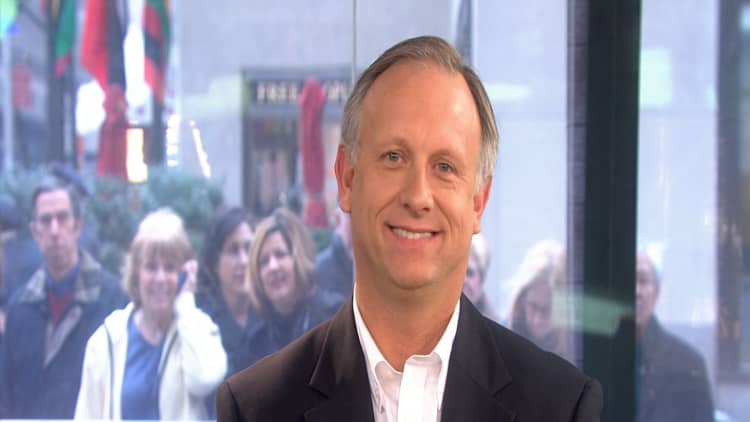When my husband was born in the early 1980s, his uncle celebrated by buying him five shares of Disney stock for a total of $5. The purchase was motivated by emotion as well as by practicality. "I clearly remember reflecting that Disney stock was particularly appropriate for a baby," his uncle says.
The bet turned out to be a good one. My husband and I just sold the stock for $36,000, more than I have sometimes made in a year.

My own relatives were fond of playing the market and were fortunate enough to have the necessary resources and education. My grandfather had been born into poverty in a crowded tenement on Manhattan's Lower East Side but he went to great free public schools, including CCNY. That enabled him to get white-collar jobs and work his way up into the middle, and then upper-middle, class.
He sent his own children to college and, as soon as his grandchildren arrived on the scene, he started saving to help send us to college, too.
That meant sacrifices: He and my grandmother lived frugally, cooked and entertained at home, and drove an old Buick.
The money that could have gone to extravagances went, instead, into the market.
My grandfather passed away several years ago at 89. Going through his office, my mother found a detailed list he kept of the securities he bought on behalf of his grandchildren and how they had appreciated.
In the mid-1980s he began buying us bonds. Then, starting in 1990, he put money into PepsiCo, Boeing, Pfizer, AT&T and SunMicrosystems. Total cost: Nearly $50,000 per grandchild.
By the spring of 2001, when I was a sophomore in college, each of us had a portfolio that had more than doubled in value.
Not every stock appreciated to the same degree, of course. AT&T went down precipitously, and though Sun Microsystems went up during the relevant time period, my parents held onto it too long. My mother recalls that we lost about $100,000 when it bottomed out.
Still, my grandfather's shrewd investments, and the fact that he prioritized the education and prospects of the next generation, were part of the reason I was fortunate enough to go to a private liberal arts school without taking on any debt. I was able to begin my career without the devastating student loan burden that limits the choices of millions of people in my generation.
Thanks to him and to my parents, who also worked hard and sacrificed on their children's behalf, I was able to do what millions of my contemporaries can't: Save for my own future.
So should you start gifting stock certificates to the children in your life? I polled the experts and they mostly say yes, though with some qualifications.
Financial planner Tom Corley points out that stocks are risky since they mean you "put all your eggs in one basket." Instead, he suggests that present-givers consider contributing to, or setting up, a child's 529 plan. Those education savings accounts "allow you to invest a small amount of money in hundreds of stocks in a tax-advantaged way (no tax on gains and dividends inside a 529 Plan)," he tells CNBC.
Prices are also higher than they were in the 1980s and '90s, so, Corley points out, "even $5,000 will only buy you so many stocks," any or all of which could, of course, under-perform. If you do want to invest yourself on behalf of a child, be sure to take precautions by diversifying.
Sophia Bera, founder of Gen Y Planning, concurs that a 529 plan is a smarter bet these days, since it is "more diversified and can be used for qualified education expenses and has favorable tax treatment."

But giving children stocks can serve an educational purpose, too. Sharon Schweitzer, founder of Protocol & Etiquette Worldwide, notes that it can help teach the child about investing and finance in general from an early age. She tells CNBC that, "as the child grows, they learn about why the stock's value goes up and down, and begin thinking of using their money to play the market instead of computer and video games."
That said, consider the context and age-appropriateness of the companies you choose and the message your support for them might send. "It is important to choose a stock that reflects you, your values, and will reflect positively on the recipient," she says. "The stock selection doesn't need to be based entirely on the stock's long-term outlook. Consider Build-A-Bear, Dreamworks, Walt Disney, Nike, Hasbro, or Under Armour."
Steve Siebold, author of "How Rich People Think," agrees that the upsides, including financial literacy, outweigh the down. "Giving stock as a baby gift is also a great idea because even if the stock doesn't perform well over time, it's an opportunity to teach that child about money from an early age," he says.
"Parents can sit down with their kids and show them what's going on. It doesn't have to be a complicated lesson in the markets, but kids will find it fascinating to know that they're potentially making money," he says. "Even better, you're giving them a basic education in money and investing that will benefit them for the rest of their lives."
That worked for him. "My aunt bought me stock as a kid and I started tracking its progress early on," Siebold recalls. "It was fun to watch the stock make money, but more importantly it taught me some very valuable lessons about money. I learned all about the stock market, investing and making money from an early age, and without that gift I never would have learned any of this so young in life.
"It got me so interested in making money," Siebold adds, "that I started buying my own stocks with the money I accumulated over the years at the age of 15."



